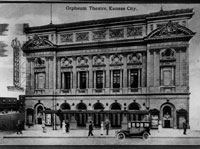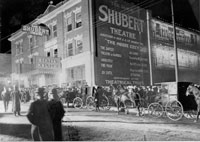Orpheum Theatre, 9th and May Streets, northwest corner;
Grand Opera House, 704 Walnut Street;
Convention Hall, 13th Street and Central Avenue, northeast corner;
Shubert Theatre, 104 West 10th Street;
Willis Wood Theatre, 11th Street and Baltimore Avenue, northwest corner;
Talbot's Hippodrome, 13th and McGee Streets, southwest corner;
the five-cent show, between Grand Avenue and Walnut Street.
Truman loved Kansas City's theaters. His letters to Bess during the early years of their courtship are full of talk about different theaters, particularly the Orpheum (pictured left), which was clearly his favorite. "Bess, please don't give up shows after February 5 [the beginning of Lent]," he begged in one letter. "Something extra fine will be sure to come to the Orpheum sure as you do." (Letter of February 4, 1913, Papers Relating to Family, Business and Personal Affairs.)
The Orpheum, and the Grand Opera House (pictured right), which Truman also liked, presented vaudeville shows such as the Four Cohans, Eddie Foy, and the minstrels Primrose and Dockstader. "…Between the time I was about 16 to 20," Truman said when he was President, "I used to go to every vaudeville show that came to Kansas City at the old Orpheum, and at the Grand…." He ushered on Saturdays for a while at the Orpheum. (The President's News Conference of September 8, 1949, in Public Papers of the Presidents: Harry S. Truman, 1949, Item 205.)
Sometimes Truman was in the mood for something a bit more highbrow than vaudeville. He went to piano recitals at the Convention Hall and the Shubert. "…Vladimir de Pachmann and [Joseph] Lhevinne are going to play in KC this winter," Truman wrote Bess in September 1911. "Lhevinne is the best on the globe, I think, and when they come…[maybe] we'll go hear them…. They can tear up a piano from the keyboard side. (Letter of September 16, 1911.) Truman also heard such great pianists as Ignace Paderewski, Moriz Rosenthal, and Augusta Kotlow play at the Convention Hall and the Shubert.
The Shubert Theatre (pictured left) must have been a remarkably beautiful building. When Truman was asked to show a friend of his father's the sights of Kansas City, he chose two places, and the Shubert--"from the outside" as Truman reported to Bess--was one of them. (Letter of February 10, 1913.) Once in a while, Truman would go to an opera at the Convention Hall. "I have some cousins in Kansas City [Myra and Mary Colgan] who affect intellect," he wrote to Bess. "They once persuaded me to go to a season of Grand Opera with them. It happened to include Parsifal and some others which I cannot spell. Well I haven't recovered from that siege of Grand Opera yet. Perhaps if they give me small doses I might have been trained, because I do love music…. But when it comes to a lot of would be actors and actresses running around over the stage and spouting song and hugging and killing each other promiscuously, when I had rather go to the Orpheum." (Letter of January 10, 1911.)
Despite this outburst of feeling against opera, Truman asked Bess about a year later to go with him to see Donizetti's Lucia di Lammermoor. "Do you think you could stand some Grand Opera?" he asked hesitantly. "I have a desire to hear Lucia di Lammermoor…. I don't believe that just one yelling match would be unenjoyable. I have never seen Lucia and I am curious to know how much torture one has to endure to get to hear the sextet." (Letter of November 28, 1911.) Harry and Bess went, and they enjoyed it. "I enjoyed [Lucia] more than any Grand Opera I ever heard," Truman wrote. (Letter of December 14, 1911.)
Truman also liked Shakespeare, which he saw at the Willis Wood (pictured right) and the Auditorium, and musicals like The Girl from Utah and Gilbert and Sullivan operettas, both of which he saw at the Shubert. Not every show presented by the Kansas City theaters was good. "There was a punk show at the Hip[podrome]," Truman warned Bess. A "toe dancer" named Tillie Zick was very good when she was dancing, "but she insisted on changing her duds right out in sight," which Truman found embarrassing. The rest of the show was no good at all. "Don't get stung there this week if you're in town," he advised Bess. "Go to the ten-cent store and see a better show for nothing." (Letter of September 30, 1913.) Bess apparently liked the theater as much as Harry did, and both of them enjoyed to go again and again. Sometimes, one show in a day was not enough. "How would you like to see the Orpheum road show in the afternoon," he asked Bess toward the end of 1912's theater season, "and then go to dinner somewhere and then go to the Shubert? We could end up the season in one big splash…." (Letter of February 27, 1912.)
Truman continued to go to the theater while he was President. "President Truman has been our town's most active Number One theatergoer since Woodrow Wilson…," the Washington Post reported in Truman's last week as President. "Mr. Truman is a wonderful audience…. He 'gives' the way actors long for audiences to 'give.' Most of all, he seems to go out of his way to believe what's being shown him, be it comedy or tragedy…." (Richard L. Coe, "Number One Fan, Mr. Truman Fine Friend of Drama," Washington Post, January 18, 1953.) The theaters featuring live shows had to compete with movie houses for Truman's business. He liked the new silent cinematic shows, and they were cheap. In one of his letter to Bess Wallace, he recommends an unnamed "little old five-cent show between Grand and Walnut on the south side of the street.…" This place, he says, has "the best shows there are…." The only complaint he has is that on Mondays it shows to-be-continued serials. "…They are so thrilling," Truman admits, "that they can be tolerated." He tells Bess about one serial he had just seen. "[It] had a fight on the highest building in San Francisco in which one of the combatants was pitched headfirst to the sidewalk. It also had a chase through the fairgrounds. You get all this for the whole sum of five cents too…." (Letter of December 29, 1914.)



